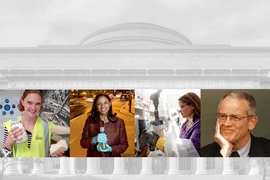When Phoebe Ayers started volunteering as an editor for a relatively new site called Wikipedia 13 years ago, she never imagined it would lead to her walking a red carpet in Amsterdam, passing throngs of tourists snapping photos like paparazzi as she prepared to meet the Dutch royal family.
Ayers, who joined the MIT Libraries in August as the electrical engineering and computer science librarian, traveled to the Netherlands in November to represent the Web-based, free-content encyclopedia. Wikipedia is the 2015 recipient of the Erasmus Prize, given annually by a Dutch cultural institution, Praemium Erasmianum Foundation, for exceptional contributions to culture, society, and social science, in Europe and beyond. Ayers was one of three people chosen to accept the award on behalf of the Wikipedia community, which has more than 70,000 active contributors from across the globe.
“As a librarian, I’m in the business of helping people find information. Wikipedia is the largest, most accessed reference work in the world,” says Ayers, who has served on the board of trustees of the Wikimedia Foundation, the San Francisco-based nonprofit that runs the site, and organized its annual conferences. She also co-authored the book "How Wikipedia Works: And How You Can Be Part of It."
Speaking on behalf of libraries and academia, Ayers addressed the audience at the royal palace, including King Willem-Alexander, Queen Máxima, Princess Beatrix, and approximately 150 "Wikipedians," volunteer editors who had been extended an open invitation to attend the ceremony.
“I want to live in a world where my neighbor and I can both look at the same Wikipedia article and both get access to the sources cited in it, even though I work for one of the world’s great universities and she does not,” said Ayers in her speech. “Libraries, museums, and Wikipedia have a lot in common. We are all committed to preserving our cultural heritage and knowledge and sharing it widely.”
Given her passion for the project and its ethos of open access to information, it is not surprising that Ayers wound up at MIT, a leader in making the research and scholarship it produces freely available.
“Wikipedians are a community of people so passionate, quirky, and deeply interested in different things,” she said. “It’s also very internationally oriented, with a deep sense that we’re doing important work. Not unlike MIT.”
When Ayers began graduate school in library science, few of her peers had even heard of the site, which was started in 2001. In its early days, Wikipedia’s reliability was questioned, but its place in the academic landscape has changed dramatically over the last decade. It now harnesses the power of what Ayers calls “an army of scholarly people” who devote hundreds of thousands of hours to improving the site’s content. “It’s aspirational; it’s not finished,” she says. “We all want it to be better, and that’s why academia should participate. There are many people who don’t have access to the MIT Libraries — or even a public library — for whom Wikipedia is their only source of information. I think we as academics have a compelling responsibility to contribute to it.”
Today Wikipedia has more than 35 million articles in more than 250 languages. It is the seventh most-visited website in the world. Educators are increasingly using it in their teaching, and Ayers welcomes the opportunity to work with faculty on best practices.
“A lot of students write a paper for a class, and eventually it winds up in the dustbin,” she says. “When students write an article for Wikipedia, they have to learn to collaborate, to research and to write for a popular audience, and their work will benefit the millions of people using the site.”
During January’s Independent Activities Period (IAP), the MIT Libraries are offering a workshop on integrating Wikipedia into classroom instruction, along with an introduction to editing site content and a Writing Black History into Wikipedia edit-a-thon. Ayers would like to see the Institute community’s contributions continue to grow, especially in the many non-English language versions of the site. It’s a natural extension of a long-held tradition of openness and of generating and sharing knowledge to benefit others.
“At MIT, there is such a focus on sharing our research with the world and on participating in conversations about global problems,” she says. “I think Wikipedia is a huge potential platform for that work.”










